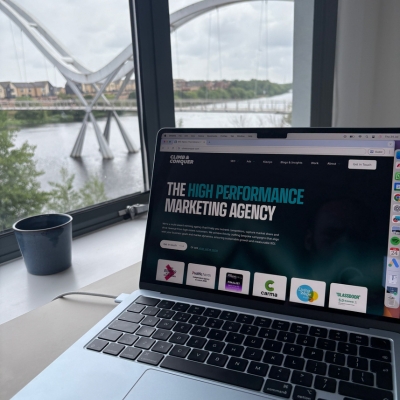Quick Navigation:
- How Long Does SEO Take To Start Working?
- What Factors Influence SEO Timelines?
- The Different Stages of an SEO Campaign
- How to Speed Up SEO Results
One of the most common questions we hear is, “How long does SEO take to work?” If you’re investing in SEO, you want to know when you’ll see more revenue, right?
In truth, SEO results typically take anywhere from 3 to 4 months to come to fruition – but that depends on multiple factors, including your website’s history, your competition, your strategy, your budget, and the technical foundations of your site. Unlike paid ads, which deliver instant traffic, SEO is a long-term investment that builds momentum over time.
Why SEO takes time:
- Search engines don’t rank new content overnight – they evaluate factors like the relevance and usability of your pages.
- SEO is highly competitive, especially in industries where multiple businesses fight for the same keywords. 7/10 businesses already invest in SEO (including your competitors), so you’ll have to do extra leg work to catch up.
- Google’s algorithm updates constantly shift rankings, which is known as “volatility.” User engagement plays a key role in this process. Google analyses user signals, such as click-through rate (CTR), time on page, and bounce rate, to understand whether a page satisfies search intent.
- Google considers both the page itself and the overall state of the site, so if your site has been neglected for a while, optimising a single page will not really help in the grand scheme of things. You need to convince Google that your site is high quality, not just one or two pages, which may take time.
SEO takes time, but the right strategy makes all the difference. Get in touch today and see how we can speed up your rankings.
How Long Does SEO Take To Start Working?
SEO isn’t an overnight process, and anyone promising instant rankings is either misleading you or using black-hat tactics that could get your site penalised. The reality is that most websites start seeing SEO results within 3 to 4 months, with bigger gains appearing after 6 to 12 months.
General SEO Timeline:
- 0-3 months: Here, the foundations are set – technical fixes, keyword research, and content creation. Rankings may start shifting, but major results are unlikely yet.
- 4-6 months: Some pages gain traction, and traffic, leads & conversions gradually increase.
- 6-12 months: This is when the momentum builds. Positive ROI, higher rankings, more traffic, better leads, and conversions start becoming more common.
- 12+ months: This is where authority builds, meaning SEO can continue to drive long-term, sustainable growth. At this stage, SEO often consistently pays for itself.
Note: This is not the same for every business and is just a general timeline based on what we would expect to happen by adhering to best practices. Of course, it depends on the factors we will cover in this blog, plus factors out of your control, like Google algorithm changes, for example.
What Factors Influence SEO Timelines?
There’s no one-size-fits-all answer to how long it takes for SEO to start working. Several factors influence how quickly (or slowly) you’ll see results:
Website History & Domain Authority
Older websites with some authority tend to rank faster than brand-new domains. If a site has been around for years, has existing content, and has a decent domain trust score, it already has a head start.
Competition & Industry Niches
SEO is a very competitive field, and if you’re in a crowded niche, breaking into the top results takes longer. Highly competitive industries (finance and eCommerce, for example) are often dominated by big players who have been doing SEO for years.
Content Strategy & Keyword Targeting
Good SEO results depend on quality content, and strategic keyword use is an important part of this. If your website consistently publishes well-optimised, useful, and relevant content, rankings will happen faster.
- Targeting long-tail, intent-specific keywords (e.g., “handmade sofa beds”) often ranks faster than broad, high-volume terms (e.g., “sofa beds”).
- Optimising existing content can deliver faster SEO results than creating new pages from scratch. While it can take 2-3 months for new content to start ranking, optimising existing pages can show improvements in as little as 2-3 weeks. A study from Ahrefs found that the average age of pages ranking in the top 10 positions is over 2 years old, with the number 1 ranking pages averaging nearly 3 years old.
Technical SEO & Site Performance
Google doesn’t just look at content – it considers how well your website functions and if it’s maintained well – the technical SEO foundations that it’s built on. A slow, broken, or poorly structured website will struggle to rank, no matter how good the content is. After all, user experience (indirect) and page speed (direct) are ranking factors.
Technical SEO Factors:
- Fast site speed (improves user experience & is a direct ranking factor).
- Mobile optimisation (Google prioritises mobile-friendly sites).
- Fixing indexing errors (ensuring Google can crawl all important pages).
- Using structured data & schema markup (helps with featured snippets & better SERP visibility).
Backlinks & Off-Page SEO
Google also looks at how many reputable websites link to yours. This is where creating high-quality content is important, as other websites will use your content as a source (link-baiting assets like calculators, for example). A strong backlink profile signals trust and authority, making ranking easier.
- High-quality backlinks from authoritative sites (news, industry leaders, niche blogs).
- Spammy or low-quality backlinks can harm your rankings.
- Organic link-building takes time, but it’s probably the strongest ranking factor besides content quality.
The Different Stages of an SEO Campaign
We covered the general timeline of an SEO campaign earlier in the blog, but we feel the need to discuss the different aspects of each stage in more detail so you can get a clearer picture of what to expect at different points in your campaign.
Month 1: Research & Technical SEO Fixes
Your website needs a strong foundation before its rankings can improve. The first month is all about setting the stage for long-term success.
- Comprehensive SEO audits – Identifying technical errors, indexing issues, and crawl problems.
- Keyword research – Finding the right terms to target, including long-tail and high-converting keywords.
- Technical fixes – Improving site speed by optimising images, enabling caching, & minimising unnecessary scripts. Ensuring your site is mobile-friendly with responsive design and fast-loading pages. Fixing broken links and redirect errors to improve user experience and help search engines crawl your site more efficiently.
Month 2-3: Content Creation & On-Page SEO
Once the technical foundation is established, the focus shifts to content and on-page SEO.
- Content Optimisation – Refreshing out-of-date content, improving keyword targeting, reducing/replacing thin content, and optimising service/product pages.
- On-page SEO – Using title tags, meta descriptions, internal linking, and schema markup.
- Creating & publishing high-quality content – Creating blog posts and landing pages.
Note: Content optimisation and on-page SEO often go hand in hand because when you optimise content, such as a service page, you also optimise the title tag and other on-page SEO elements.
Month 4-6: Authority Building & Organic Growth
By this stage, momentum builds, and your site starts gaining authority in search engines.
- Optimising for conversions – CTR (click-through rates) and CRO (conversion rate optimisation). This includes involving more USPs and pain points in your content.
- Expanding content strategy – Covering new keywords and improving existing rankings with deeper and more informative content.
Month 6-12: Ranking Growth & ROI Begins
The work done in the previous parts of the campaign compounds over time, meaning this is the time when you’ll likely see the most growth.
- Content creation – Revamping/refreshing content to keep it fresh and relevant.
- Keyword targeting tweaks – Targeting high-intent search queries for lead generation/conversions.
- Monitoring performance & adjusting strategy – Using Google Analytics and Search Console to track progress.
12+ Months: SEO Momentum & Continuous Growth
If you’ve maintained a consistent SEO strategy, your website should now generate ongoing organic traffic and rank for high-value keywords.
- Updating & repurposing old content to stay relevant.
- Competitor analysis to maintain rankings and target new opportunities.
- Expanding into new search opportunities (e.g., featured snippets, AI overview, or additional SERP features).
How to Speed Up SEO Results
SEO takes time, but some strategies can accelerate results if implemented correctly. While there’s no shortcut to instant rankings, focusing on high-impact actions can help you move the needle that little bit faster.
1) Target Low-Competition, Long-Tail Keywords
Instead of trying to rank for high-competition, broad keywords, focus on long-tail keywords that are easier to rank for and bring in highly targeted traffic. Long-tail keywords generally tend to have lower search volume but higher conversion rates.
Tools like Ahrefs, Semrush, Google Search Console & Google Keyword Planner can help you find these opportunities.
2) Improve Site Speed & Technical SEO
A slow, unoptimised website can hold back rankings, even if your content is great. Google prioritises sites that provide fast speeds and good user experience.
Quick wins for technical SEO:
- Compress images to improve page speed. Page speed insights and the core web vitals section in Google Search Console are great for finding issues like this.
- Use Google Search Console to identify and fix crawl errors.
- Following the first point, make sure your site is mobile-friendly (Google uses mobile-first indexing).
3) Refresh & Optimise Existing Content
Not all SEO gains come from new content – updating old pages can improve rankings quickly.
- Identify pages with declining rankings in Google Search Console and refresh them.
- Add updated information and statistics (if possible), and any new keywords you’ve identified from Google search console or your own keyword research.
Improve readability with shorter paragraphs, bullet points, and better structure. Formatting pages using boxes is great for user experience; our SEO services page is a great example.
Need Help With Your SEO?
SEO isn’t just about publishing content and hoping for the best – it requires a strategy to see real results.
If your site isn’t ranking as fast as expected, technical issues or poor content could slow things down. Even if you’re doing everything right, without a clear strategy, you might miss opportunities to drive more traffic to your site and, most importantly, convert more visitors into customers.
At Climb & Conquer, we specialise in technical SEO, on-page optimisation, and content strategies that help businesses gain traction faster.
If you’re unsure whether your SEO efforts are on track, now’s the time to take action. We’ll audit your site, identify what’s holding you back, and implement the right fixes to ensure your pages are optimised for search engines and users.




